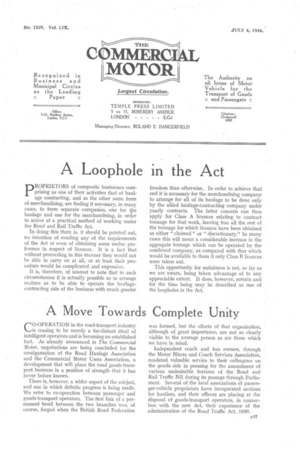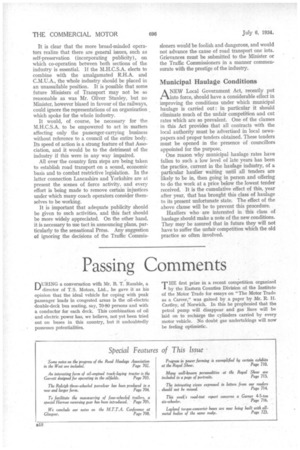A Move Towards Complete Unity C 0-OPERATION in the road-transport industry
Page 35

Page 36

If you've noticed an error in this article please click here to report it so we can fix it.
is ceasing to be merely a far-distant ideal of intelligent operators and is becoming an established fact. As already announced in The Commercial Motor, negotiations are being concluded for the amalgamation of the Road Haulage Association and the Commercial Motor Users Association, a development that will place the road goods-transport business in a position of strength that it has never before known.
There is, however, a wider aspect of the subject, and one in which definite progress is being made. We refer to co-operation between passenger and goods-transport operators. The first link of a permanent bond between the two branches was, of course, forged when the British Road Federation was formed, but the efforts of that organization, although of great importance, are not so clearly visible to the average person as are those which we have in mind.
Independent coach and bus owners, through the Motor Hirers and Coach Services Association, rendered valuable service to their colleagues on the goods side in pressing for the amendment of various undesirable features of the• Road and Rail Traffic Bill during its passage through Parliament. Several of the local associations of passenger-vehicle proprietors have inaugurated sections for hauliers, and their officers are placing at the disposal of goods-transport operators, in connection with the new Act, their experience of the administration of the Road Traffic Act, 1930. It is clear that the more broad-minded operators realize that there are general issues, such as self-preservation (incorporating publicity), on which co-operation between both sections of the industry is essential. If the M.H.C.S.A. elects to combine with the amalgamated R.H.A. and C.M.U.A., the whole industry should be placed in an unassailable position. It is possible that some future Ministers of Transport may not be so reasonable as was Mr. Oliver Stanley, but no Minister, however biased in favour of the railways, could ignore the representations of an organization which spoke for the whole industry.
It would, of course, be necessary for the 1VI.H.C.S.A. to be empowered to act in matters affecting only the passenger-carrying business without reference to a council of the entire body. Its speed of action is a strong feature of that Association, and it would be to the detriment of the industry if this were in any way impaired.
All over the country firm steps are being taken to establish road transport on a sound, economic basis and to combat restrictive legislation. In the latter connection Lancashire and Yorkshire are at present the scenes of fierce activity, and every effort is being made to remove certain injustices under which many coach operators consider themselves to be working.
It is important that adequate publicity should be given to such activities, and this fact should be more widely appreciated. On the other hand, it is necessary to use tact in announcing plans, particularly to the sensational Press. Any suggestion of ignoring the decisions of the Traffic Commis sioners would be foolish and dangerous, and would not advance the cause of road transport one iota. Grievances must be submitted to the Minister or the Traffic Commissioners in a manner commensurate with the prestige of the industry.
Municipal Haulage Conditions
ANEW Local Government Act, recently put .into force, should have a considerable effect in improving the conditions under which municipal haulage is carried out : in particular it should eliminate much of the unfair competition and cut rates which are so prevalent. One of the clauses in this Act provides that all contracts with the local authority must be advertised in local newspapers and proper tenders obtained. These tenders must be opened in the presence of councillors appointed for the purpose.
One reason why municipal haulage rates have fallen to such a low level of late years has been the practice, current in the haulage industry, of a particular haulier waiting until all tenders are likely to be in, then going in person and offering to do the work at a price below the lowest tender received. It is the cumulative effect of this, year after year, that has brought this class of haulage to its present unfortunate state. The effect of the above clause will be to prevent this procedure.
Hauliers who are interested in this class of haulage should make a note of the new conditions. They may be assured that in future they will not have to suffer the unfair competition which the old practice so often involved.




































































































